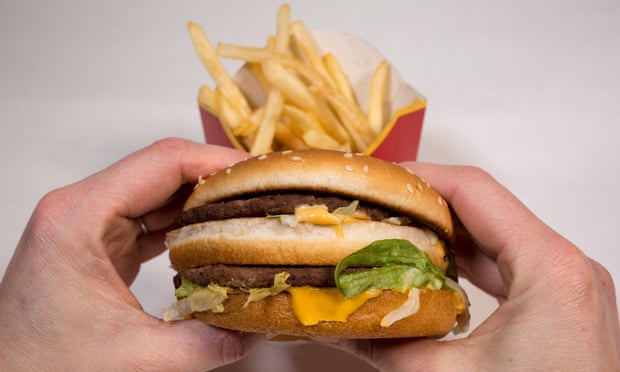Advertising will be banned for most sugary drinks, hamburgers, chocolate bars and salted nuts across the entire Transport for London network, which also includes London Overground, tram services and bus stops.
Fast-food chains will still be allowed to advertise on the tube but only if they promote their healthy products such as unsalted nuts, raisins and sugar-free drinks. They will not be allowed to simply promote their brand or generic logo, to avoid creating a loophole.
Representatives of the advertising industry criticised the move, suggesting it could cost TfL tens of millions of pounds in revenue at a time when the transport system was facing a financial crunch.
The mayor had previously announced his intention to restrict advertising for foods high in fat, sugar and salt but has now confirmed the ban will take effect early next year, following a consultation which found Londoners were firmly in favour.
Last month Public Health England figures revealed over 37% of 10 and 11-year-olds in London were overweight or obese, prompting Khan to describe childhood obesity in the capital as a “ticking timebomb”.
“It’s clear that advertising plays a huge part in the choices we make, whether we realise it or not, and Londoners have shown overwhelming support for a ban on adverts for junk food and drink on our transport network,” he said.
TfL is facing a funding squeeze and the decision to drop adverts for unhealthy food is likely to lead to a reduction in revenue, although the mayor’s office said it hoped the same brands would continue to pay to promote healthy alternatives.
Justin Cochrane, the chairman of trade body Outsmart, which represents outdoor advertising companies, said adverts for such food could currently earn TfL up to £35m a year. He warned not all of that lost revenue would be replaced after the ban comes into force in three months. “They’re convinced that new advertisers will come in and that could be the case but over a much longer period of time. Advertising plans are already done for next year.”
He said Khan had declined to work with the industry on finding a compromise that would preserve TfL’s revenue: “The way he’s doing it feels completely wrong. It feels like a political thing.
“There’s no evidence to say that banning advertising particularly helps with childhood obesity. We already have loads of voluntary codes.”
Cochrane said other areas of the UK might follow London’s lead. Amsterdam recently introduced a similar advertising ban following a successful drive to reduce childhood obesity.
The British TV industry is already facing growing calls for restrictions on fast-food advertising, with broadcasters warning it could reduce the budget of the commercial TV industry by £200m a year.
Channel 4 has previously said it was a serious financial risk for broadcasters and bans on advertising certain foods pre-watershed, as proposed by celebrity chef Jamie Oliver, could reduce its ability to make programmes.
The Guardian
More about: Junkfood
















































